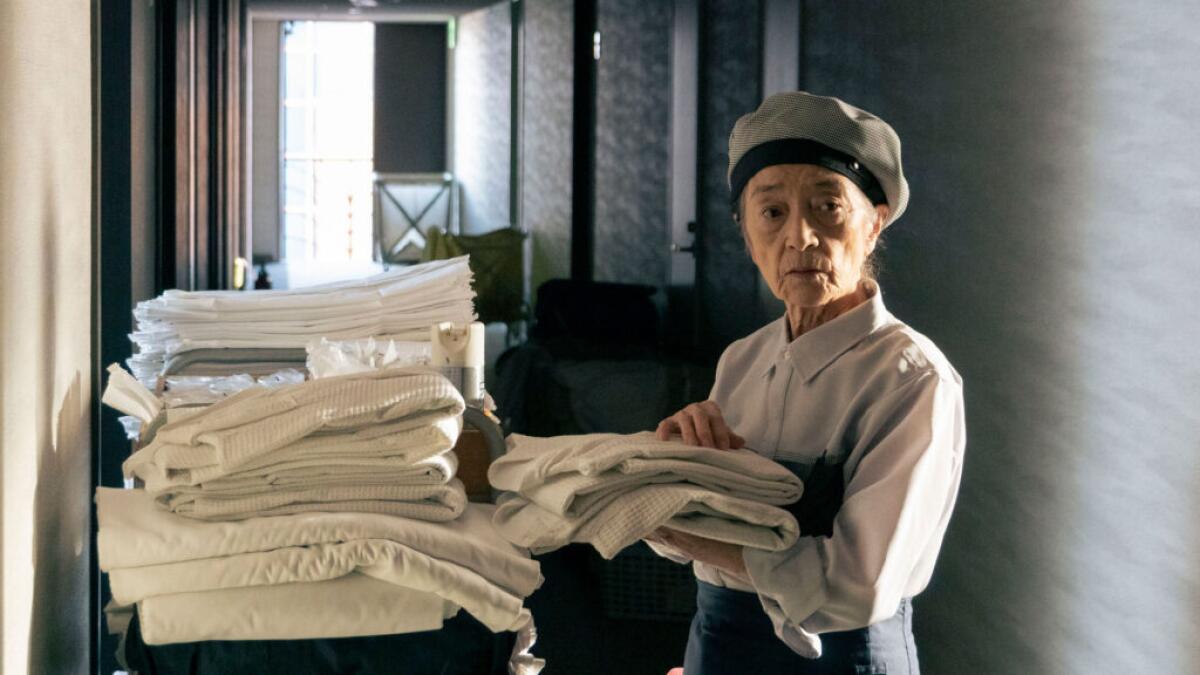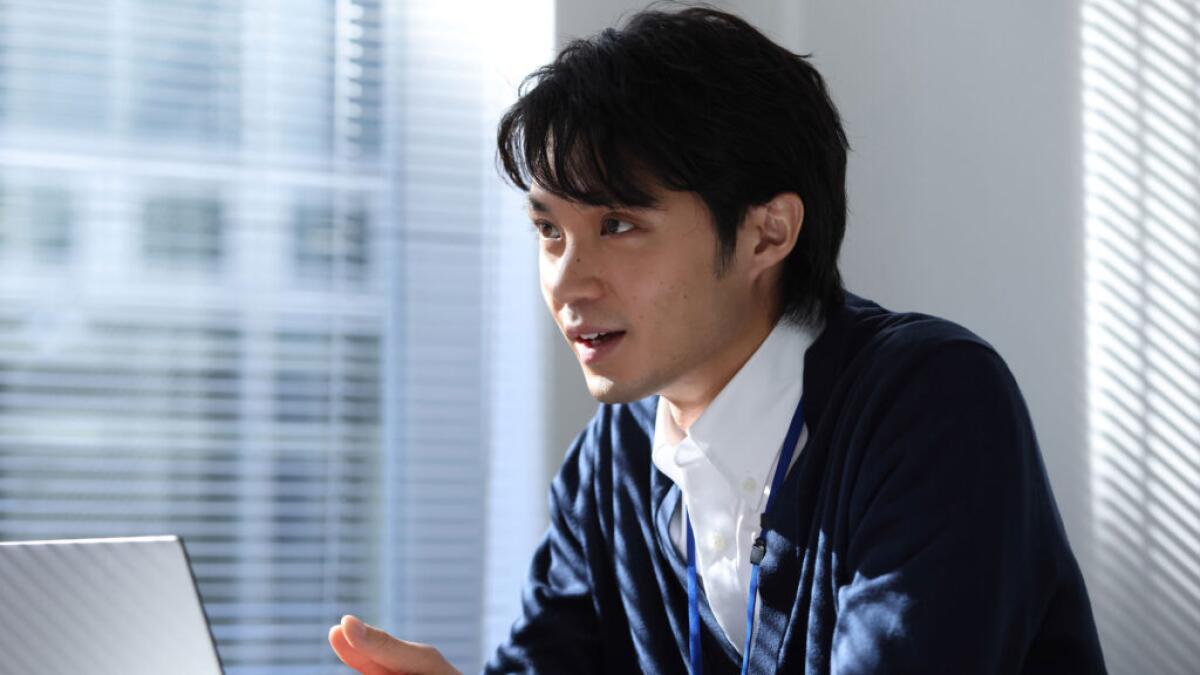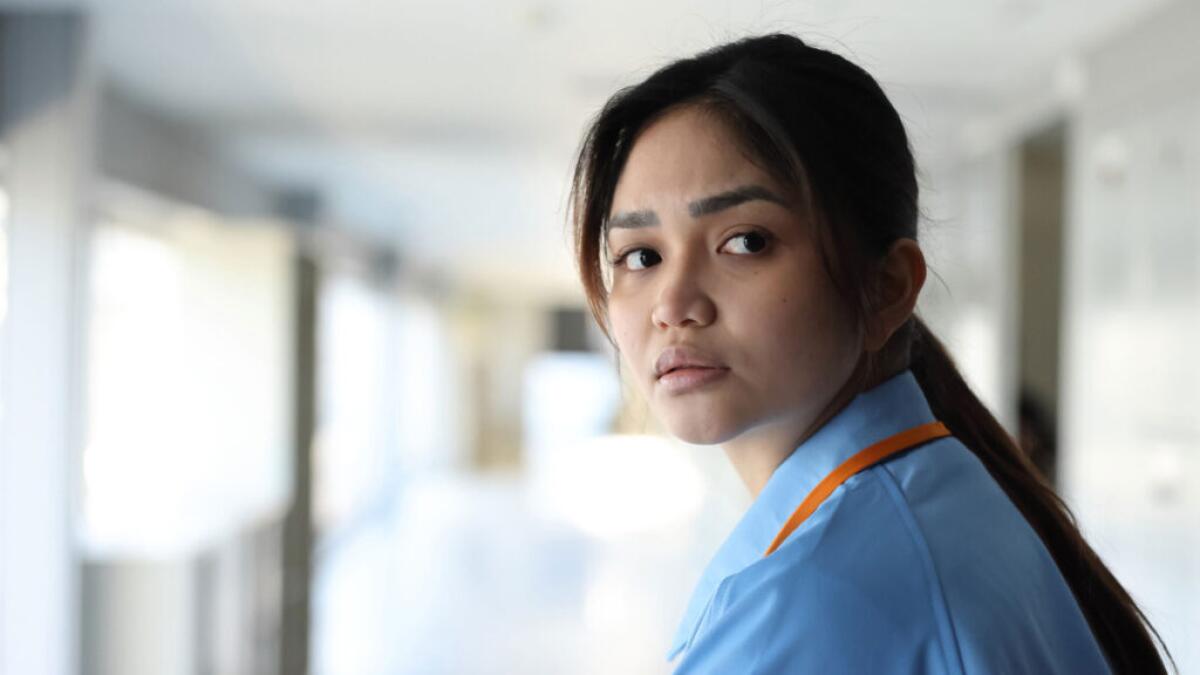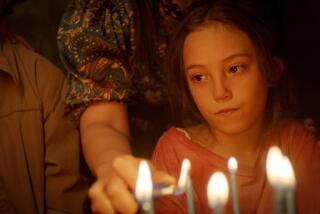Review: In the eerie dystopia of ‘Plan 75,’ a mass suicide program takes effect

- Share via
In “Plan 75,” an alternately warm and chilling dispatch from a dystopian near-future, death mostly happens out of sight, just a few steps beyond the frame. Sometimes we see the grim aftermath: a body slumped over at a table, another being stuffed into a car, still another being efficiently stripped of cash and jewelry. But the actual moment is usually left off-screen, and not solely out of respect for the deceased. In this quietly provocative debut feature, the Japanese writer-director Chie Hayakawa charts the insidious mentality of a social order that has begun executing its elder population with methodical efficiency, soothing reassurances and a neatly drawn curtain. Out of sight, out of mind, right?
Hayakawa, expanding productively on her 2018 short film, puts the lie to that assumption. She opens her story with a gauzily disorienting image that soon sharpens into a jolt of terror — one that may incline your thoughts, not that they need much inclining, toward recent gun-violence headlines. But this isn’t America; it’s Japan, or a version of Japan where public anger has turned against the country’s oldest citizens for their allegedly disproportionate drain on resources. To that end, the government authorizes Plan 75, a free-euthanasia program for citizens 75 or older, complete with a 100,000-yen stipend (less that $750 U.S.) that can be used for luxury spa services, funeral arrangements or a hell of a final meal.
We first hear about these perks in a queasy-funny scene in which a 78-year-old hotel cleaner named Michi (a superb Chieko Baisho) visits a Plan 75 clinic and leafs through a brochure with her friends. They’re amused, impressed, curious and probably more than a little alarmed, though the vibe of the place is so insistently relaxed — a vibe born out by the cinematographer Hideho Urata’s calm, measured compositions — that you can see the idea beginning to take root. In this and other moments, “Plan 75” seems to operate in a thematic zone that’s not quite satire and not quite science fiction; it falls somewhere in between, a speculative humanist-horror movie about the power of mass suggestion, in which a dreadful proposition has already become a legislated reality.

What’s dreadful, to be clear, isn’t the concept of assisted suicide so much as the idea that it should be indiscriminately offered, prescribed and encouraged for a swath of the population whose existence others find inconvenient. For her part, Michi, with her good health and unflagging energy, thinks she has some time before having to really consider such a drastic next step. She’s wrong: When tragedy randomly strikes at work, Michi loses her job and, soon after, her apartment.
That she and others like her have been toiling in low-paying jobs, well past the standard retirement age, isn’t a script contrivance. It’s a reflection of a country where, as the Japan Times reported last year, 13.5% of the working population is over 65 and where, for the first time, those 75 and older now account for more than 15% of the total population.
Apart from a few fleeting topical nods, Hayakawa doesn’t delve too deeply into socioeconomic specifics, nor does she dramatize or even depict the power structures that implemented Plan 75 in the first place. And although her movie does eventually morph into a thriller of sorts, it never becomes as harrowing as the euthanasia clinic scenes in “Soylent Green” (1973) or as shocking as P.D. James’ description of a mass suicide ceremony gone horribly awry in her 1992 novel, “The Children of Men.” (That sequence was omitted from Alfonso Cuarón’s very good film adaptation.)
Hayakawa is interested in the logistical mechanics of the Plan 75 operation up to a point, but what she wants to leave us with, more than anything, is a sense of its cruel banality. A mass suicide program is merely the most extreme symptom of a society-wide malaise that systematically abuses and devalues its oldest citizens.

Hayakawa keeps her story at an intimate and, for the most part, effective human scale. Baisho’s beautifully calibrated performance holds us close, turning Michi’s every step — a brief stint as a traffic guard, a trip to a cafe she once frequented with her husband — into a quiet act of resistance against her perceived uselessness.
In time the movie introduces other key characters, like Hiromu (Hayato Isomura), a young Plan 75 employee who earnestly believes in the good of the company’s mission, only to have second thoughts when his long-estranged uncle (Takao Taka) signs up, and on his 75th birthday no less. (“That’s the spirit!” Hiromu’s colleague enthuses.) More peripheral to the action is Maria (Stefanie Arianne), a Filipina worker who finds herself carrying out some of the program’s least savory operations, all so she can make enough money to find a lifesaving operation for her young daughter.
There may be something overly tidy about the way the script uses Hiromu and Maria to illuminate some inconvenient truths about the system, and particularly the way it pulls its three narrative threads together at the climax. Even so, it’s all very much to Hayakawa’s point: The political is always personal, and ageist cruelty affects and implicates everyone. It also explains why “Plan 75,” for all its clinical gloom and enveloping despair, ends up sounding a curious note of optimism. Death may remain unseen, but so, for that matter, are the young and old, quietly mounting small yet hugely significant acts of resistance and survival.
‘Plan 75’
In Japanese with English subtitles
Not rated
Running time: 1 hour, 52 minutes
Playing: Starts May 5 at Laemmle Monica Film Center, Santa Monica
More to Read
Only good movies
Get the Indie Focus newsletter, Mark Olsen's weekly guide to the world of cinema.
You may occasionally receive promotional content from the Los Angeles Times.











